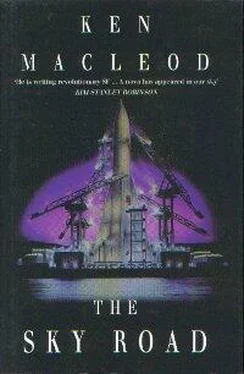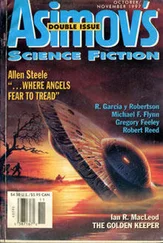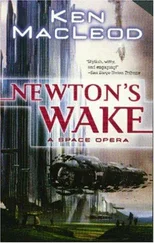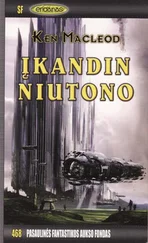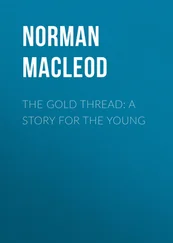Ken Macleod - The Sky Road
Здесь есть возможность читать онлайн «Ken Macleod - The Sky Road» весь текст электронной книги совершенно бесплатно (целиком полную версию без сокращений). В некоторых случаях можно слушать аудио, скачать через торрент в формате fb2 и присутствует краткое содержание. Год выпуска: 1999, ISBN: 1999, Издательство: Orbit, Жанр: Фантастика и фэнтези, на английском языке. Описание произведения, (предисловие) а так же отзывы посетителей доступны на портале библиотеки ЛибКат.
- Название:The Sky Road
- Автор:
- Издательство:Orbit
- Жанр:
- Год:1999
- ISBN:1-85723-755-2
- Рейтинг книги:3 / 5. Голосов: 1
-
Избранное:Добавить в избранное
- Отзывы:
-
Ваша оценка:
- 60
- 1
- 2
- 3
- 4
- 5
The Sky Road: краткое содержание, описание и аннотация
Предлагаем к чтению аннотацию, описание, краткое содержание или предисловие (зависит от того, что написал сам автор книги «The Sky Road»). Если вы не нашли необходимую информацию о книге — напишите в комментариях, мы постараемся отыскать её.
The Sky Road — читать онлайн бесплатно полную книгу (весь текст) целиком
Ниже представлен текст книги, разбитый по страницам. Система сохранения места последней прочитанной страницы, позволяет с удобством читать онлайн бесплатно книгу «The Sky Road», без необходимости каждый раз заново искать на чём Вы остановились. Поставьте закладку, и сможете в любой момент перейти на страницу, на которой закончили чтение.
Интервал:
Закладка:
Menial gazed abstractedly out of the window.
“What thought is the rain thinking?”
“Can’t you hear it?” I said. “It’s thinking ‘yesssss’.”
“Hmm,” she said. “Now there’s a. coincidence…”
We used the couple of days before my reinstatement in my job at the yard for the beginnings of an education in fine soldering and in programming, the latter subject being simultaneously fascinating and maddening. We also made a painstaking study of the Deliverer’s documents, which continued—after we’d returned the originals to Gantry, and I’d returned to work at the yard—with the photocopies, but they yielded no information relevant to the ship’s mission. The folder from the 2050s reinforced, in its casual references and assumptions more than its explicit statements, the staggering extent of the orbital activity of pre-Deliverance humanity. But it contained no hint of the Deliverance itself.
There was one moment when I thought I had won a real historical insight, albeit one tangentially relevant to our immediate concerns.
I looked up from the stack of papers on Menial’s broad table. Every evening after work, I’d slowly sifted through them, as now, in the late sun.
“Menial?” I said. She turned from the seer-stone apparatus on which she was working, and laid down her soldering-iron.
You found something?”
“No, just—realised something. These Greens she talks about in some of her articles, the marginal people who lived outside the cities. She makes the point here that they had a lot more practical skills than folk gave them credit for, that they weren’t just ignorant barbarians but farmers and smiths and electricians and so on.”
“Yes,” she said, with a mysterious smile. “That was true.”
“Well! These people, the Greens, they must have been the ancestors of the tinkers!”
“Here,” she said, passing me a cigarette. “You’re going to need this.”
“Why?” I asked, lighting up.
“Because—oh, Dhia, how can I break this to you gently? You’ve got it the wrong way round entirely! Why do you think we call the settled folk ‘the outsiders’?”
“What?”
“Aye, the Greens, the barbarians, these are not our ancestors, Clovis. They’re—I was going to say yours, but I can’t say that any more, mo graidh, now you’re one of us. They’re the ancestors of the outsiders! We are the survivors, the descendants, of the city folk!”
“So how is it that we—I mean the outsiders—live in the cities now?”
She stood up then, walking around the small room like a lecturer, gesturing with her cigarette.
“Oh, but your face is a picture, colha Gree! They live in the cities now because they invaded them, they moved in at the Deliverance when the old civilisation and city life had broken down. And they’re still there, bless them, blundering around like the barbarians they are, in the borrowed costumes of the past. All these scholars that you wanted to emulate, they’re just rummaging about in the ruins, reading books they misunderstand so badly it isn’t funny. You’re well out of that, my love, you’ll learn more from us in a year than in a lifetime at the University!” Indeed.
A huge cheer went up, almost drowning the inrush-ing roar of water, as the sluice-gates opened. The water poured over the edge of the drydock in a saline Niagara that went on and on, until it seemed that the loch itself would be lowered before the deep hole was filled. Faster than a tide, the water crept up the legs and pontoons of the platform.
Menial’s hand gripped mine as we made our way through the crowd, pushing to the front like children. The entire accessible part of the cliff-edge around the dock was lined with people. Everybody who’d worked at the yard, on the platform or the ship, was certainly there, along with casual visitors from the surrounding towns, keen sightseers from all over the Highlands, and outright enthusiasts from even farther afield. A couple of hundred metres around the cliff and inward, officers of the International Scientific Society, project managers and exemplary workers made speeches from a wooden stage with a raised dais and an awning. Nobody farther away than fifty metres, at the outside, could make out a word these dignitaries said, particularly not from the PA speakers strung out like fairy-lights on catenaries of cable all over the place. Squawks and howls and crackles worthy of a railway station echoed around the cliff-faces.
I ducked in between a couple of workers at the front who’d incautiously allowed a quarter of a metre to open up between them. Menial followed with, no doubt, a smile at both of them which made them feel they were being done a favour.
And then we were there, a metre or two from the crumbling, tussocked edge. The platform and the spaceship loomed startlingly close. At that moment another cheer went up, as though to acclaim our arrival, and I realised that the capsule at the tip of the probe was, minutely but perceptibly, swaying. The platform was afloat.
“Hoo-rrayy!” I shouted, joining enthusiastically in the applause. Menial yelled something almost too high to hear beside me; I could hardly hear myself. Though a less spectacular moment than the flooding of the dock, it was freighted with greater significance: the beginning of the Sea Eagle/Iolair’s journey, which would end in space.
It was a strange launch vehicle, simultaneously more primitive and more advanced than anything sent into space in the first age of space exploration. The ancients could, no doubt, have built a fusion torchship, but they didn’t. They went straight from massive liquid-fuelled rockets to the nanotech diamond ships of the last days. In our time, with chemical fuels relatively expensive and nanotech (other than the tinker computers) quite beyond our reach, and the secret of controlled fusion still extant, the fusion torch is a logical choice.
But, as Fergal had implied, building it out of boiler plate was a trifle inelegant. On the other hand, the skills were there, locally available from shipbuilding; and the weight—given the immense power of the engine—was not a significant constraint. And say what you like about red-leaded steel plate, it is reliably resistant to sea-water. There was, of course, no question of launching such a monster from anywhere on land, which is less forgiving—of intense heat, high-energy particles and unstable isotopes—than the sea.
Its mission, too, was primitive, or at least simple: to launch into orbit an experimental communications and Earth-observation satellite. That payload had required the co-operation of scientists and engineers (tinkers or otherwise), lens-makers and photographers, from all over the civilised world. Its electronic and electrical systems strayed suspiciously close to the path of power—even deploying, if you wanted to be awkward, a system very like television. But after much soul-searching and acrimony, the majority of the most respected practitioners of Natural Theology had, with some reluctance, nodded their long-haired heads. Television, they gravely pointed out, had been destructive only as a mass medium. To object to it as a method of communication from a satellite to a ground station would, they averred, be crass superstition, unworthy of this enlightened age.
Needless to say, a minority of their equally respected, though (it has to be said) usually older, colleagues insisted that this was the first step on a slippery slope at the bottom of which lay a population reduced to a passively rotting mass of mental and physical wrecks. With equal inevitability, given the nature of Natural Theology, a much smaller (and, yes, younger) faction were pointing out that the sort of abject helotry described and decried by their conservative colleagues were in fact the peoples better known as the ancients, who had watched television assiduously and had an achievement or two to their credit before they fell. To which, of course… but the argument’s further iterations would be tedious to elaborate.
Читать дальшеИнтервал:
Закладка:
Похожие книги на «The Sky Road»
Представляем Вашему вниманию похожие книги на «The Sky Road» списком для выбора. Мы отобрали схожую по названию и смыслу литературу в надежде предоставить читателям больше вариантов отыскать новые, интересные, ещё непрочитанные произведения.
Обсуждение, отзывы о книге «The Sky Road» и просто собственные мнения читателей. Оставьте ваши комментарии, напишите, что Вы думаете о произведении, его смысле или главных героях. Укажите что конкретно понравилось, а что нет, и почему Вы так считаете.
